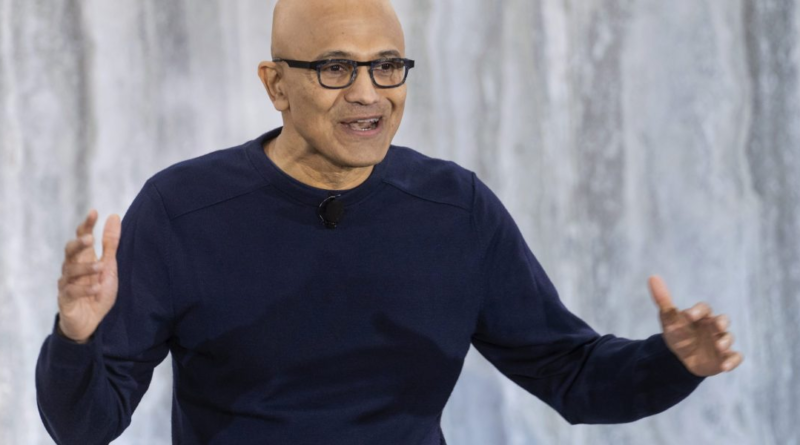Microsoft CEO says it's important for AI to have 'human preferences and societal norms' as Bing launches with ChatGPT
Microsoft is fusing ChatGPT-like technology into its search engine Bing, transforming an internet service that now trails far behind Google into a new way of communicating with artificial intelligence.
The revamping of Microsoft’s second-place search engine could give the software giant a head start against other tech companies in capitalizing on the worldwide excitement surrounding ChatGPT, a tool that’s awakened millions of people to the possibilities of the latest AI technology.
Along with adding it to Bing, Microsoft is also integrating the chatbot technology into its Edge browser. Microsoft announced the new technology at an event Tuesday at its headquarters in Redmond, Washington.
Microsoft said a public preview of the new Bing will launch Tuesday for users who sign up for it, but the technology will scale to millions of users in coming weeks.
Yusuf Mehdi, Microsoft’s corporate vice president and consumer chief marketing officer, said the new Bing will go live for desktop on limited preview. Everyone can try a limited number of queries, he said.
The strengthening partnership with ChatGPT-maker OpenAI has been years in the making, starting with a $1 billion investment from Microsoft in 2019 that led to the development of a powerful supercomputer specifically built to train the San Francisco startup’s AI models.
While it’s not always factual or logical, ChatGPT’s mastery of language and grammar comes from having ingested a huge trove of digitized books, Wikipedia entries, instruction manuals, newspapers and other online writings.
Microsoft Corp. CEO Satya Nadella said Tuesday that new AI advances are “going to reshape every software category we know,” including search, much like earlier innovations in personal computers and cloud computing. He said it is important to develop AI “with human preferences and societal norms and you’re not going to do that in a lab. You have to do that out in the world.”
The shift to making search engines more conversational — able to confidently answer questions rather than offering links to other websites — could change the advertising-fueled search business, but also poses risks if the AI systems don’t get their facts right. Their opaqueness also makes it hard to source back to the original human-made images and texts they’ve effectively memorized, though the new Bing includes annotations that link to sources.
Gartner analyst Jason Wong said new technological advancements will mitigate what led to Microsoft’s disastrous 2016 launch of the experimental chatbot Tay, which users trained to spout racist and sexist remarks. But Wong said “reputational risks will still be at the forefront” for Microsoft if Bing produces answers with low accuracy or so-called AI “hallucinations” that mix and conflate data.
Google has been cautious about such moves. But in response to pressure over ChatGPT’s popularity, Google CEO Sundar Pichai on Monday announced a new conversational service named Bard that will be available exclusively to a group of “trusted testers” before being widely released later this year.
Wong said Google was caught off-guard with the success of ChatGPT but still has the advantage over Microsoft in consumer-facing technology, while Microsoft has the edge in selling its products to businesses.
Chinese tech giant Baidu also this week announced a similar search chatbot coming later this year, according to Chinese media. Other tech rivals such as Facebook parent Meta and Amazon also worked on similar technology, but Microsoft’s latest moves aim to position it at the center of the ChatGPT zeitgeist.
Microsoft disclosed in January that it was pouring billions more dollars into OpenAI as it looks to fuse the technology behind ChatGPT, the image-generator DALL-E and other OpenAI innovations into an array of Microsoft products tied to its cloud computing platform and its Office suite of workplace products like email and spreadsheets.
The most surprising might be the integration with Bing, which is the second-place search engine in many markets but has never come close to challenging Google’s dominant position.
Bing launched in 2009 as a rebranding of Microsoft’s earlier search engines and was run for a time by Nadella, years before he took over as CEO. Its significance was boosted when Yahoo and Microsoft signed a deal for Bing to power Yahoo’s search engine, giving Microsoft access to Yahoo’s greater search share. Similar deals infused Bing into the search features for devices made by other companies, though users wouldn’t necessarily know that Microsoft was powering their searches.
By making it a destination for ChatGPT-like conversations, Microsoft could invite more users to give Bing a try.
On the surface, at least, a Bing integration seems far different from what OpenAI has in mind for its technology. Appearing at Microsoft’s event, OpenAI CEO Sam Altman said the “the new Bing experience looks fantastic” and is based in part on learnings from its GPT line of large language models. He said one of the reasons for the Microsoft partnership is to help get OpenAI technology “into the hands of millions of people.”
OpenAI has long voiced an ambitious vision for safely guiding what’s known as AGI, or artificial general intelligence, a not-yet-realized concept that harkens back to ideas from science fiction about human-like machines. OpenAI’s website describes AGI as “highly autonomous systems that outperform humans at most economically valuable work.”
OpenAI started out as a nonprofit research laboratory when it launched in December 2015 with backing from Tesla CEO Elon Musk and others. Its stated aims were to “advance digital intelligence in the way that is most likely to benefit humanity as a whole, unconstrained by a need to generate financial return.”
That changed in 2018 when it incorporated a for-profit business Open AI LP, and shifted nearly all its staff into the business, not long after releasing its first generation of the GPT model for generating human-like paragraphs of readable text.
OpenAI’s other products include the image-generator DALL-E, first released in 2021, the computer programming assistant Codex and the speech recognition tool Whisper.
Learn how to navigate and strengthen trust in your business with The Trust Factor, a weekly newsletter examining what leaders need to succeed. Sign up here.


